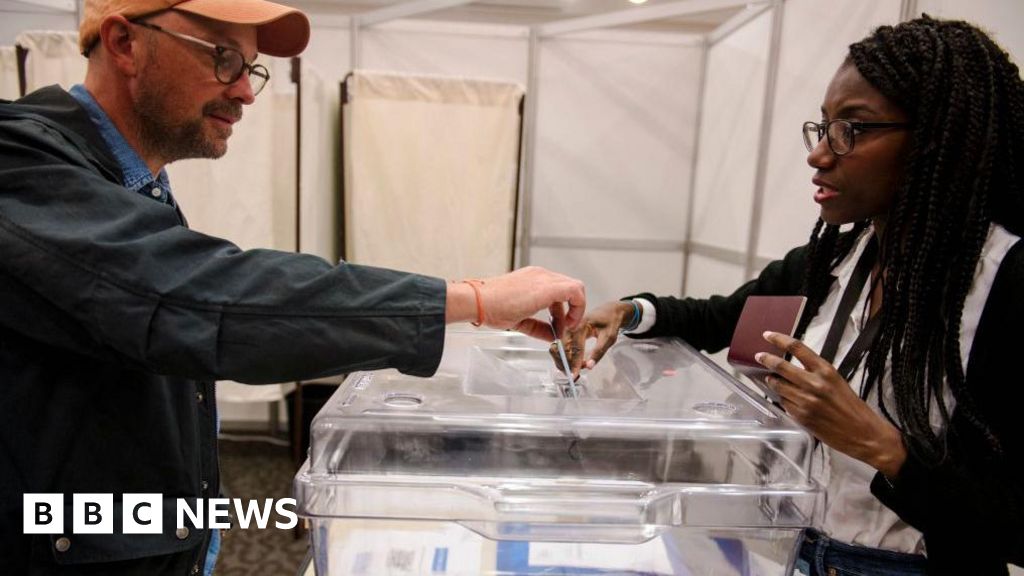Image source, ANDREJ IVANOV/AFP
- Author, Paul Kirby
- Role, BBC News, Paris
France votes on Sunday in a parliamentary election that could make history, with the far right closer to power than it has ever been in modern times.
The National Rally (RN) of Marine Le Pen and Jordan Bardella are well ahead in the polls – three weeks to the day since they won European elections and President Emmanuel Macron reacted by calling a national vote.
More than 2.6 million people of France’s 49 million voters have registered to vote by proxy, an indication of the high turnout expected for such a pivotal election.
This is a two-round election, and most of the National Assembly’s 577 seats will not be decided until the second-round run-off vote next Sunday.
The campaign only lasted 20 days, and that also benefited RN, which quickly refined its existing promises on immigration, insecurity as well as tax cuts to tackle the cost-of-living crisis.
Jordan Bardella wants to be RN’s first prime minister, and his party is confident of winning dozens of constituencies outright in the first round.
But he says he will only take the job if the party secures an absolute parliamentary majority of 289 seats. The alternative would be a hung parliament and stalemate.
As soon as the first results come in on Sunday evening, National Rally’s opponents will have to decide who to back in run-off battles across France, in a bid to ensure that absolute majority does not happen.
Image source, THOMAS SAMSON/POOL/AFP
If the polls are right, many of the run-offs will pit the National Rally against a hastily cobbled together left-wing alliance called New Popular Front, which believes it could even win the election.
In previous elections, parties from across the spectrum have united to keep the far right out and voters have held their noses to do so.
But RN’s leaders have worked hard for years to shed their extremist image. Alongside policies for giving French citizens “national preference” for jobs and housing, they want to cut VAT on energy and allow under-30s to escape income tax.
In Franconville, north of Paris, a teacher called Agnès complains about the breakdown of discipline in French schools and likes Jordan Bardella’s plans for “a big bang in authority” in education. “I’ll either vote right or far right. I like Bardella’s charisma,” she says.
She also has no problem with RN’s plans to abolish droit du sol, the right to automatic French citizenship for children born to foreign parents if those children have spent five years in France – from the age of 11 to 18 when they are entitled to a apply for French citizenship.
President Macron’s Ensemble alliance is widely expected to haemorrhage seats, and Gabriel Attal’s days as prime minister appear numbered, even though polls suggest he remains the most popular politician in France.
“The Macron era is over,” François Hollande declared ahead of the vote.
Mr Hollande, the former French president who was Mr Macron’s boss and mentor, is standing for parliament again – now as a New Popular Front candidate.
However, even Macron allies are angry with his snap election gamble.
France was not due another election for three more years, and it had far better ways of spending the summer than going through an abbreviated and intense election campaign.
The national football team faces Belgium in the last 16 of Euro 2024 on Monday, and all of France has been gearing up for the Paris Olympics which start on 26 July.
Metro stations like Concorde have been shut, and restrictions are in place close to any of the Games sites.
The police and military were already stretched and the interior minister has warned of potential violence after the second round.
Mr Macron is set to meet his prime minister and other members of the government on Monday to decide their next move.
Until now their mantra has been “ni-ni” – neither back RN nor the left-wing New Popular Front, because of the involvement of France Unbowed (LFI), which is condemned by opponents as far-left and some of its members have been accused of antisemitism.
President Macron has said only his Ensemble alliance has the power to block both “the extreme right and the extreme left”. He says the far right categorises people by their religion or origin, while the left judges them by the community they belong to.
Last week, on a hot evening in Meaux, east of Paris, one of LFI’s most senior figures, Mathilde Panot told supporters they were “the only focus of resistance” remaining to the rise of the far right, accusing the Macron alliance of opening the gates of power to RN.
“We’re not extreme, what is extreme is Mr Macron’s extreme liberalism which has brought about the rise of the extreme right,” she told the BBC.
The New Popular Front also includes more moderate parties, including the Socialists and the Greens, whose leader Marine Tondelier has called for a unified stance to stop Mr Bardella becoming prime minister.
Some of France’s best-known young stars have urged voters to steer clear of the extremes, from NBA sensation Victor Wembanyama and football captain Kylian Mbappé to YouTube influencer Squeezie.
But the divisions between the parties are deep and the time extremely short for any concerted action to keep RN at bay.
“I worry for our country,” said Aurélie, outside a market in Le Plessis Bouchard, to the north of Paris. She is unimpressed by the nationalist policies RN has. “Patriotism isn’t nationalism, it’s not the same.”
#France #votes #farright #National #Rally #hopes #history,
#France #votes #farright #National #Rally #hopes #history
